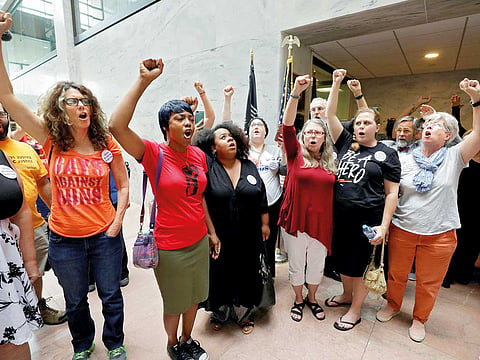#WhyIDidntReport sexual abuse: “I didn’t report it. I thought it was my fault”
Why are people speaking up on social media?

WASHINGTON: When the #Me-Too movement erupted on social media last year, people who had been sexually harassed, abused or assaulted — and felt ready to discuss it — went public with their stories.
Now a new hashtag has surfaced as if in answer to the question: Why didn’t you say something sooner?
It began when Christine Blasey Ford, 51, came forward as the writer of a letter in which she accused Judge Brett M. Kavanaugh, President Trump’s Supreme Court nominee, of pinning her on a bed, groping her and covering her mouth to keep her from screaming when they were teenagers.
Survivors of abuse have rallied around a new hashtag, #WhyIDidntReport, to highlight the difficulties, fear, anger and shame that so often surround sexual harassment and assault.
Here is a selection of the horrific experience of survivors who tweeted using the hashtag:
Comment: Victims relive the horror
A swell of pain and unspoken stories
Silence is their scream. They told no one because no one would believe them. Denial was their only safety valve against the extreme violation.
Social taboo, ostracisation, lack of understanding and the culture of blame are often some of the reasons why people who suffer sexual assault don’t report the perpetrator.
It is also about power, the power over the victim.
And this is a problem as old as man, it is not unique to a Western or Eastern culture.
Most women and some men face it at some point in their lives, but in the words of Twitter user @rweingarten: “I didn’t report it. I thought it was my fault. I thought I should have known better. I should have been smarter. I carried it with me for years and years. #WhyIDidntReport”
The case of Christine Blasey Ford, the American university professor who has accused the US Supreme Court Nominee Brett Kavanaugh of attempted rape in high school, has brought back with a force the #ididnotreport hashtag, which was started several years ago by a London Feminist Network blogger, as reported by Mashable.
Its new alternative form is: #WhyIDidntReport
The blogger had told the website then that when she started it, she ”imagined that it was predominantly low-level street harassment which was not reported, but it wasn’t just this sort of abuse, that came up on that hashtag. Far more serious attacks go unreported”. This was 2012.
Six years later, it still brings a swell of pain and unspoken stories, especially within the #MeToo context.
Skydancer @elizadoalot54 tweeted a few hours ago: “Most young women because of how they are treated don’t come forward. I had my uniform. Ripped open. all buttons fell off… by a shop steward and dept manager as a joke while I was at work. I didn’t report. Wish I had, to protect other women. #Ididnotreport”
American actress Alyssa Milano (@Alyssa_Milano) posted about being sexually assaulted and choosing not to report it: “I was sexually assaulted twice. Once when I was a teenager. I never filed a police report and it took me 30 years to tell me parents.”
@hummer253 wrote: “I was 7 when it started by my real ‘uncle’ and continued until I was 14. I never told anyone because I still blame myself. It was my fault. Even though he threatened to kill my family. I was 42 when it came out because my precious granddaughter was born. Fear #ididnotreport”
Bonita Yarboro @yarbonic tweeted: “It was the 70s. I told my best friend who convinced me to tell our guidance counsellor. He told my mom who literally cornered me in front of her husband, the molester, and called me a liar. I was 12. He continued to molest me. #IDidNotReport again.”
So, why is this movement building on social media when social structures are failing?
Why are people speaking up? And we are seeing this happen repeatedly on these channels.
Perhaps, the answer lies in the fact that social media is finally providing a platform that is beyond the control and manipulation of who or what they fear, perhaps it’s the realisation that there are others suffering in silence like them, perhaps because these channels are finally giving them a chance to stand up and hold on to their dignity.
They need not scream in silence, anymore.



